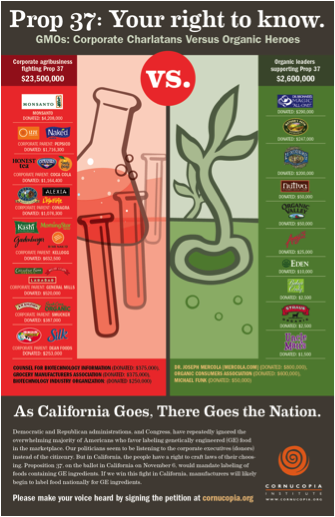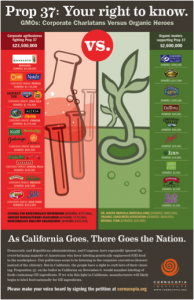
The Fight for Consumer Freedom in California’s Prop 37
October 23, 2012Student Blogs ArticleCurrently federal law does not regulate the use of genetically modified organisms in food (“GMOs”), organisms whose gene structure has been altered through genetic engineering. In 2011, 88 percent of the nation’s corn and 94 percent of its soybeans were produced using genetically engineered seeds. Despite the widespread use of GMOs, many consumers remain unaware of the high percentage of GMOs in common foods. This may change on November 6 when Californians head to the polls to vote on Proposition 37 (“Prop. 37”), also known as “The California Right to Know Genetically Engineered Food Act.” Prop. 37 would require the labeling of all of raw and processed foods that contain genetically modified material. It is estimated that 40 to 70 percent of food sold in California’s grocery stores contain such products.
Prop. 37 was the brainchild of James Wheaton, an attorney from Oakland, California. Mr. Wheaton appears to have tapped into a national concern, though, as a national poll showed that 70 percent of the respondents indicated a preference for informational labels on food. Americans have unknowingly consumed over an estimated 3 trillion servings of foods containing GMOs to date. Mark Bittman, a well-known food columnist, notes that as “things stand, you can find out whether your salmon is wild or farm-raised, and where it’s from, but under existing legislation you won’t be able to find out whether it contains the genes of an eel.” Current food labels do not make it easy for consumers to discern exactly what they are buying, and this has stimulated an outcry for more accurate labeling.
Foods with GMOs are indisputably profitable for many food manufacturers. To protect the status quo, the biotechnology industry and food manufacturers have banded together to thwart Prop. 37. California’s Secretary of State has reported that Prop. 37 opposition groups have raised over $23 million dollars. Ironically, many of the companies opposed to Prop. 37 are those that are considered sellers of natural products. Monsanto, Grocery Manufacturers of America, General Mills, Kellogg’s, and PepsiCo are but a few of the opponents of Prop. 37. The Cornucopia Institute also revealed that Kellogg’s owns the popular health-food cereal brand Kashi, and to the surprise of many customers, Kashi products contain GMOs.
Supporters of Prop. 37 include a handful of independently owned businesses that do not use GMOs and are committed to consumer rights. These companies include Nature’s Path, Nutiva, Dr. Bronner’s, and Lundberg Rice. This small coalition has been able to only raise $3 million dollars in donations to fund their efforts in support of Prop. 37.
There does not seem to be a clear answer as to whether consumers should be concerned about side effects from ingesting GMOs. Those opposed to the use of GMOs argue that the effects are largely unknown and that some studies have linked genetically modified corn to liver and kidney failure, although the Western Farm Press notes that approximately 400 studies have recognized that GMOs are safe. Other opponents note that a regulation like Prop. 37 has no basis in science and would impose unnecessary burdens on food producers and manufacturers to label their products.
Regardless of the health implications, the underlying argument behind Prop. 37 is that consumers have to the right to know what is in the food they are purchasing and consuming. The goal of Prop. 37 is not to stop the use of GMOs but to give consumers the power to make an informed choice. Mark Bittman characterizes the initiative as a step towards giving citizens the freedom that they deserve: the freedom to choose what they buy and consume. Fifty countries already have laws that require companies to disclose whether their products contain GMOs. Even if Prop. 37 does not pass, it has warned consumers across the nation that labels can be deceiving and that we may know very little about the food that we consume.
You may also like
4 comments
- November 2024
- October 2024
- April 2024
- March 2024
- February 2024
- November 2023
- October 2023
- April 2023
- March 2023
- February 2023
- January 2023
- December 2022
- November 2022
- October 2022
- May 2022
- April 2022
- March 2022
- February 2022
- January 2022
- December 2021
- November 2021
- October 2021
- May 2021
- April 2021
- March 2021
- February 2021
- January 2021
- November 2020
- October 2020
- September 2020
- August 2020
- July 2020
- June 2020
- May 2020
- April 2020
- March 2020
- February 2020
- January 2020
- November 2019
- October 2019
- September 2019
- April 2019
- February 2019
- December 2018
- November 2018
- October 2018
- September 2018
- March 2018
- February 2018
- January 2018
- December 2017
- November 2017
- October 2017
- September 2017
- May 2017
- April 2017
- March 2017
- February 2017
- December 2016
- November 2016
- October 2016
- April 2016
- March 2016
- February 2016
- January 2016
- December 2015
- November 2015
- October 2015
- June 2015
- May 2015
- April 2015
- March 2015
- February 2015
- January 2015
- December 2014
- November 2014
- October 2014
- August 2014
- March 2014
- February 2014
- January 2014
- December 2013
- November 2013
- October 2013
- September 2013
- May 2013
- April 2013
- March 2013
- February 2013
- January 2013
- December 2012
- November 2012
- October 2012
- September 2012
- June 2012
- April 2012
- March 2012
- February 2012
- January 2012
- December 2011
- November 2011
- October 2011
- September 2011
- August 2011
- April 2011
- March 2011
- November 2010
- October 2010
- September 2010

Extremely thoughtful and timely article. Adequate notice of all possible ingredients is essential to informed consumption. Theoretical allergic reactions and other possibilities necessitate this law . Further, religious or other concerns may require strict dietary maintenance. There is no argument against just enlightenment.
Very well written and researched article on a timely subject of interest to all consumers. Keep up the good work.
“Regardless of the health implications, the underlying argument behind Prop. 37 is that consumers have to the right to know what is in the food they are purchasing and consuming.”
I totally agree! Especially because we know so little about GMO’s and how they will affect long-term health outcome – we have the right to know and the right to choose whether or not we want to purchase/consume them.
In theory, I wholeheartedly agree with the Prop 37 supporters that more information about what’s in our food is necessary. However, I think we’d all be remiss if we believed that the average consumer would (a) read the label and discover that GMO’s are in the food they eat and (b) make a conscious choice to avoid such foods. Call me a cynic, but I can’t see how these new labeling requirements are going to change anything. The people who have strong feelings about GMO’s will go out of their way to avoid them regardless of what the labels do or do not say and the people who don’t know anything about them (and, according to the studies cited in the post, don’t have any reason to fear them) won’t even notice the new labels. In short, this new requirement would be useful in theory, but useless in practice.